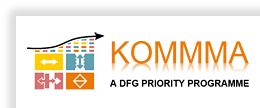| Kick and Catch - cooperative microactuators for freely moving platformsMovable masses being integrated parts of complex microsystems are typically suspended to cantilevers. The cantilevers serve as bearings to compensate for the lack of ball bearings in microtechnology. All have in common that the operational range is limited and that the actuators which provide the displacement always need to overcome the restoring spring force of the cantilevers. Consequently, if one aims to hold a movable mass in a displaced position, the actuator always needs to be switched on or a locking mechanism is required. The ubiquitous embedded systems require energy-saving solutions. This is easily fulfilled with electrostatic microactuators that only require energy for charging a small capacitor. However, magnetic or thermal actuators, e.g., continuously consume electrical power. Our proposal Kick and Catch addressed exactly this issue. We want to displace of a freely movable mass without suspending it to cantilevers. What counts is the final position in which the mass shall then be stably fixed. To account for high speed and large displacements the moving mass shall undergo a sudden push, a Kick, and then enter into a free flight phase. The landing in a defined end position shall happen in a controlled way, a foreseen and well planned Catch. We are aiming for two basic actuation scenarios: One provides a linear displacement along an axis perpendicular to the substrate and at least two stable positions, whereas the other provides a tilt where the angle between the axis and the substrate can be varied in multiple stable positions. In the first case, the Kick shall be realized using a piezo actuator, and in the second case using an electrostatic actuation. The controlled Catch shall be done in both cases magnetically combining permanent and electro magnets. Thereby, the signal of the Kick actuator shall be used to initiate an active control during the flight phase, thus replacing the bearings. Supported by dynamic simulation and flight prediction the control loop will then actuate the Catch phase allowing for smooth landing and suppressing bouncing. We are working on cooperative microactuators that are mandatory for the intended principle. Both approaches provide multistability to minimize the consumed energy. The actuator signals will also be used in a sensing mode to allow for closed-loop control. Four research groups will join forces to tackle the challenges of the new cooperative actuation concepts of Kick and Catch. Two of the four partners, Ulrike Wallrabe and Martin Hoffmann, have a long-term focus on microactuators. Tamara Bechtold is an expert in multiphysics simulation applying model order reduction to large dynamic electromechanical systems. Finally, Christoph Ament provides the expertise in control theory with a focus on nanopositioning. |
Professor Dr.-Ing. Christoph Ament Institut für Informatik Telefon: +49 821 598 – 3342 E-Mail: www.informatik.uni-augsburg.de
Professorin Dr.-Ing. Tamara Bechtold Jade Hochschule Telefon: +49 4421 2564 E-Mail: tamara bechtold ∂does-not-exist.jade-hs de www.jade-hs.de/team/tamara-bechtold
Professor Dr.-Ing. Martin Hoffmann Ruhr-Universität Bochum Telefon: +49 234 3227700 E-Mail: martin hoffmann-mst ∂does-not-exist.rub de
Professorin Dr.-Ing. Ulrike Wallrabe Albert-Ludwigs-Universität Freiburg Telefon: +49 761 203 7580 |

